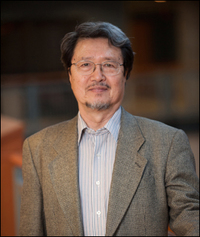Robotics is a highly interdisciplinary field focused on the design, development, validation and application of mechanical devices that entails sensing, manipulating, navigating and responding to the environment to complete tasks either autonomously or based on feedback from a human. At Vanderbilt, this research encompasses multiple topics including (semi-)autonomous systems, biologically inspired algorithms/behaviors, cognitive robotics, computer vision, digital image and signal processing, human-robot/swarm interaction, unmanned ground and aerial vehicles, and intelligent multiple robot teaming.
Kazuhiko Kawamura
 Research Professor of Electrical Engineering
Research Professor of Electrical Engineering
Emeritus Professor of Electrical Engineering, Computer Engineering and Engineering Management
Robots are finding their way into every aspect of work and home. Robotics has the potential to transform lives and work practices. For example, they have the potential to be used in often chaotic emergency rooms in order to address critical concerns facing these departments in major hospitals. These robotic assistants could register patients, collect basic diagnostic data and even periodically check up on patients.
In addition to this type of research which Kawamura initiated several years ago, Kawamura's research interests include intelligent systems design, cognitive robotics development, human-robot interaction, and robot skill learning using the working memory and cognitive control. He is an internationally recognized researcher in cognitive systems and robotics and a fellow of IEEE.
Richard Alan Peters III
 Associate Professor of Electrical Engineering
Associate Professor of Electrical Engineering
Sensorimotor coordination is the basis for intelligent behavior by animals, including people. Alan Peters' research involves a control system for industrial robots that will enable them to react in real time to a dynamic environment and to learn from that interaction. Essentially the robot learns patterns that describe "what it feels like" to perform a specific task. In theory, such patterns should enable the robot to generalize its knowledge to apply it to new tasks and to solve new problems. Peters' current research is to represent the robot's sensorimotor patterns mathematically so that they can be learned, modeled, compared, and combined.
In addition to this work, Peters' research interests include digital image processing, computer vision, digital signal processing, microcontrollers, embedded systems, applications of electromagnetic theory, and applied mathematics. He is a member of the Intelligent Robotics Lab, which investigates fundamental problems such as, sensor fusion, sensory memory, machine learning of sensorimotor coordination, and robot manipulation with the goal of incorporating the results of the research into real, working systems.
D. Mitchell Wilkes
 Associate Professor of Electrical Engineering and Computer Engineering
Associate Professor of Electrical Engineering and Computer Engineering
D. Mitchell Wilkes is currently collaborating with Pietro Valdastri on sensing and perception issues related to capsule robots. In addition, Wilkes conducts research on digital signal processing, image processing and computer vision, and medical signal processing.
Yayun Du

Assistant Professor of Electrical Engineering and Computer Engineering
Assistant Professor of Computer Science
Assistant Professor of Mechanical Engineering
Dr. Du's research focuses on developing cost-effective, low-power bioelectronics—wearable and implantable sensors—for continuous health monitoring and cardiovascular and neural disease diagnosis, adaptable across diverse populations. Additionally, she aims to advance robotics for use in challenging environments like hospital ICUs.
Affiliated Faculty
Michael Goldfarb
H. Fort Flowers Chair in Mechanical Engineering, Mechanical Engineering
Professor of Mechanical Engineering, Electrical Engineering, Physical Medicine and Rehabilitation
Nilanjan Sarkar
David K. Wilson Professor of Engineering, Professor of Mechanical Engineering, Electrical and Computer Engineering, and Computer Science
Nabil Simaan
Associate Professor of Mechanical Engineering, Otolaryngology
Pietro Valdastri
Assistant Professor of Mechanical Engineering
Robert Webster
Richard A. Schroeder Professor of Mechanical Engineering, Professor of Electrical Engineering, Otolaryngology, Neurological Surgery, Urological Surgery, Medicine